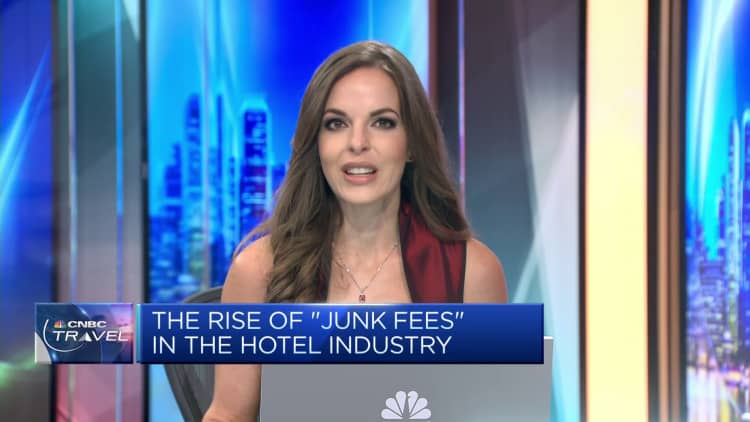A brand new U.S. rule that requires resort and short-term lodging firms to reveal so-called “junk charges” begins Monday.
Introduced by the Federal Commerce Fee in December, the rule takes direct purpose on the broadly loathed expenses, which may seem as “resort,” “vacation spot” or “hospitality service” charges and purport to grant perks that vacationers both don’t need or already count on to obtain.
These embrace “premium” web service and entry to a resort gymnasium.
The rule, which additionally applies to reside occasion ticketing firms, was designed to curtail a follow that allowed companies to cost extra “with out trying such as you’re elevating costs,” Cathy Mansfield from the Case Western Reserve Regulation Faculty instructed CNBC in December.
The professor, who focuses on shopper and business legislation, had one caveat: “I actually hope the Trump administration would not minimize the enforcement employees on the FTC and the CFPB.”

However because the rule was introduced, the Trump administration has pushed to eliminate nearly 90% of the Consumer Financial Protection Bureau’s staff and fired two FTC commissioners — actions that are being challenged within the U.S. court docket system.
Because of this, Mansfield mentioned she now believes the brand new rule is much less more likely to defend shoppers.
“With the Shopper Monetary Safety Bureau already incapacitated by the Trump administration, there in all probability will not be new protections for shoppers — a rollback of current protections the place attainable, and completely no enforcement of guidelines. This implies no safety in any respect for shoppers,” she mentioned.
In response, Chris Mufarrige, the director of the FTC’s Bureau of Shopper Safety, instructed CNBC that the company “is working arduous to guard shoppers and can proceed to pursue enforcement actions in opposition to firms that violate the legislation, together with via the brand new misleading payment rule.”
The Trump Administration additionally focused charges within the reside leisure business via an executive order on March 31 that directed the FTC to make sure worth transparency “in any respect levels of the ticket-purchase course of.”
The CFPB didn’t reply to CNBC’s request for remark.
Disclosure, however not elimination, of charges
Laurent Bacinski, a French citizen, was hit by undisclosed junk charges throughout a visit to New York Metropolis.
He pre-paid for his journey via a journey app however was nonetheless charged a $500 deposit by his resort at check-in, from which the resort deducted taxes and a nightly “vacation spot payment.” These charges supplied high-speed web, reductions on sightseeing excursions and a credit score on the resort mini-mart.
“The vacation spot payment is compelled sale of companies I do not want,” he instructed CNBC Travel.
Disclosure of those charges is the crux of the FTC’s rule, which doesn’t purpose to eradicate them, however relatively to make sure vacationers know they exist.
“The Junk Charges rule is rooted in a easy however highly effective precept: transparency,” mentioned Mansfield. “When shoppers can see the complete worth up entrance — whether or not they’re reserving a resort, shopping for live performance tickets or paying a service payment — they’re in a greater place to make knowledgeable choices and keep away from being misled.”
This transparency has already begun, mentioned Lauren Wolfe, counsel for Vacationers United, a non-profit group that has sued Hyatt, Hilton, Sonesta and Accor over the problem of resort charges.
“We have now seen much more voluntary compliance because the rule was introduced in December,” she mentioned.
Airbnb introduced in April that it started displaying cleaning and service fees upfront for patrons worldwide.
Wolfe referenced one other invoice, the Hotel Fees Transparency Act of 2025, which cleared the U.S. Home of Representatives in April, and is now set to go earlier than the Senate.
“The combo of the FTC rule, plus a invoice that has bipartisan help — and appears like it should cross — in Congress reveals that ending hidden resort resort charges is one subject as we speak that unites all Individuals,” she mentioned.
In the event you’re charged a ‘junk payment’
CNBC Journey analyzed 10 reserving web sites for a two-night keep at Balboa Bay Resort, a resort in Newport Seaside, California that expenses a $40 every day resort payment, as acknowledged on the resort’s web site.
Of the ten websites, seven disclosed the payment in varied methods — both as a “vacation spot payment,” “property payment” or “property service cost” — and three didn’t.
If vacationers encounter a resort or short-term rental charging undisclosed charges, Mansfield recommends submitting a grievance with the FTC. Penalties for violating the brand new rule can exceed $50,000.
“The FTC has a extremely easy-to-use on-line grievance system, and so they tally complaints that assist them see what’s occurring the market,” she mentioned.
She additionally instructed utilizing the CFPB’s on-line grievance system, she mentioned. “They really ahead the grievance to the corporate … that can typically get issues resolved as a result of firms do not wish to be within the crosshairs of the CFPB,” she mentioned.
Mansfield mentioned vacationers also can contact the buyer fraud division of their state Legal professional Basic’s workplace. “I’d say complain to each federal and state” authorities, she mentioned.
If all else fails, vacationers also can think about airing their grievance on social media.
“Generally with firms, the squeaky wheel will get the grease.”